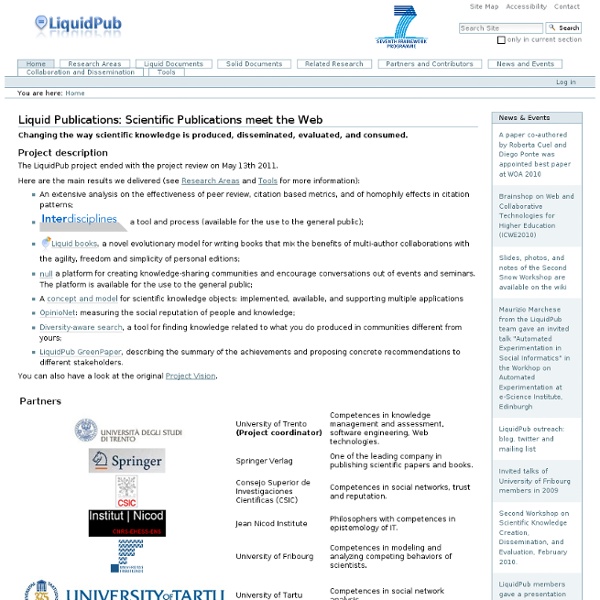



Is liquid publication and peer review the wave of the future in science? As a professor and researcher, one of my most time-consuming tasks is performing peer review. That is, reading and commenting on articles submitted to conferences and journals, proposals submitted to granting agencies, theses submitted for degrees, and promotion dossiers (which themselves require reading several papers). In this post I will point out the strengths and weaknesses of the current peer review systems, as I see them, and make some suggestions for change. The suggestions include adopting what is called liquid publication in parallel with the classic gate-keeping style of peer review. Peer review is essential to science, it serves several purposes including: Forcing researchers to adhere to standards of good research, since they don't want to be embarrassed by being caught making mistakes.Slowing down the publication process sufficiently to allow for 'sober second thought'. Badly written liquid publications will not be read. Making parts of reviews completely open.
Liquid Publications A possible alternative to Peer Review and the ‘publish or perish’ logic of academic publishing URL = “In a nutshell, the approach proposes the following ideas and contributions: 1. It introduces the notion of Liquid Publications (and, analogously, Liquid Textbooks) as evolutionary, collaborative, multi-faceted knowledge objects that can be composed and consumed at different levels of detail. 2. 3. Although the change advocated here is dramatic, the transition is not.
Research Evaluation — LiquidPub Project Documents Reviewing peer review: a quantitative analysis of peer review Fabio Casati, Maurizio Marchese, Katsiaryna Mirylenka, Azzurra Ragone In this paper we focus on the analysis of peer reviews and reviewers behavior in a number of different review processes. Is peer review any good? Fabio Casati, Maurizio Marchese, Azzurra Ragone, Matteo Turrini (This is a short and limited version of D3.1v1) In this paper we focus on the analysis of peer reviews and reviewers behavior in conference review processes. Is peer review any good? A quantitative analysis of Peer Review. On the correlation between bibliometric indicators and rankings of conferences and researchers. In Liquid Proceedings of the Interdisciplinary Workshop on Trust and Reputation. This paper aims at finding correlation between bibliometric indicators, that are traditionally used in research evaluation (e.g. citations count, h-index, g-index, etc.), with perceived reputation of researchers and conferences. Tools Reseval
University of Trento - Italy - UNITN-Eprints - Reviewing peer review: a quantitative analysis of peer review Casati, Fabio and Marchese, Maurizio and Mirylenka, Katsiaryna and Ragone, Azzurra (2010) Reviewing peer review: a quantitative analysis of peer review. UNSPECIFIED. (Unpublished) In this paper we focus on the analysis of peer reviews and reviewers behavior in a number of different review processes. Interdisciplines Copy/paste this URL to link to this paper The concept of homophily [2] describes relationships that are based on some measures of similarity or closeness. Despite the fact that no single definition exists for similarity, in the scope of this work, we consider two types of relationships to define similarity: citation and co-authorship. Abstract : Abstract The concept of homophily [2] describes relationships that are based on some measures of similarity or closeness. Using these relationships, we can measure similarity to be inversely proportional to the distance that separates researchers in the co-authorship network and papers in the citation network [3]. Introduction : Introduction In recent years usage of bibliometric indicators in evaluation of research impact has become frighteningly mainstream. For instance, Lalo and Mosseri [1] argue that H-index favors publishing in bigger scientific domains over smaller ones. Central Claim : Definitions and Rationale Definition 1. Definition 2. 1.